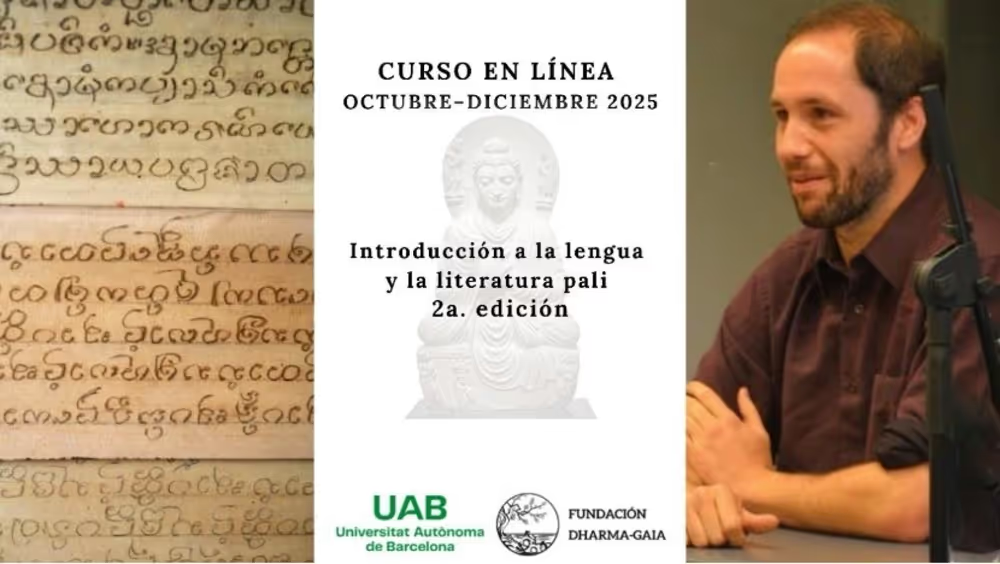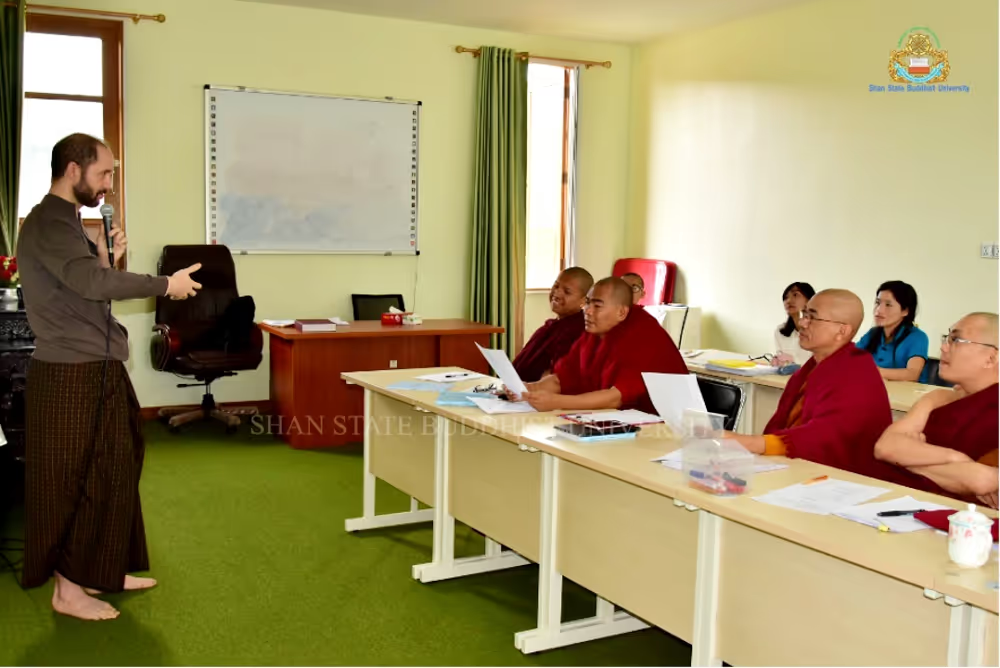The Autonomous University of Barcelona (UAB) and the Dharma-Gaia Foundation (FDG) are pleased to announce the second edition of the course "Introduction to Pali Language and Literature". It is designed for those who wish to explore and deepen their knowledge of this classical language, essential for the study of ancient Buddhist texts. This course has been developed thanks to the initiative of FDG, which has played a key role in its creation and promotion.
The course will be taught by Professor Aleix Ruiz Falqués, PhD in Asian Studies from the University of Cambridge and internationally recognized expert in the field. UAB stands out as one of the best universities in Spain in international rankings. All course sessions will be recorded, allowing students to access them at any time during the duration of the course, ensuring a flexible and accessible learning experience.

Course content:
In this course, we will explore the Pali language, used in early Buddhist texts, including the renowned discourses of the Buddha and ancient treatises on Buddhist ethics and meditation. The teaching of the course, conducted through synchronous online classes, combines the study of grammar and the reading of translations. The Pali Canon represents one of the most complete sources of the Buddha's teachings. Through this course, we will also immerse ourselves in the original Buddhist texts by learning the Pali language. Classes will include exercises that will address fundamental aspects of Buddhism.
Language and scope:
It is taught in Spanish and is aimed at students and the general public who are highly interested in the subject.
Duration:
The course will have a duration of 25 teaching hours, equivalent to 4 ECTS credits. There will be 2 hours of class per week through the virtual campus spread over two days.
Dates and schedule:
The course will be held from September 29 to December 22, 2025, on Mondays and Wednesdays from 17:00 to 18:00 (Spanish time), coinciding with the morning in Latin America, which facilitates the participation of students from this region.
Location and format: virtual campus
The course format is virtual and consists of two one-hour videoconference sessions per week. In order to offer the greatest possible flexibility, the classes will be available on a deferred basis, allowing participants to access the content at the time that is most convenient for them.
Enrollment:
The course offers a limited number of 30 places, to be filled on a first-come, first-served basis.
The registration fee is 120 €.
Admission requirement:
The only requirement for admission to the course is to have passed the secondary school level.
Certifications
A certificate of achievement will be awarded to participants who satisfactorily complete the course. The cost of the certificate of achievement is not included in the tuition fee.
Academic direction:
Gustavo Pita Céspedes
Daniel Millet Gil
About the instructor:
Aleix Ruiz Falqués holds a PhD in South Asian Studies from the University of Cambridge and has a distinguished academic career in the field of Pali language and literature. His training includes Sanskrit studies at the University of Pune and a PhD specializing in the Pali grammatical tradition of Burma, which gives him a unique and rich perspective in this field. His pedagogical approach combines academic rigor with a deep appreciation for the Buddhist tradition, facilitating the understanding of Pali texts in their historical, literary and philosophical context.
Among his most outstanding works is the translation from Pali into Spanish of the anthology En palabras del Buddha ( Kairos, 2019), as well as the translation Los últimos días del Buddha [Mahāparinibbānasutta], with commentary by Buddhaghosa (Madrid: Trotta, 2022). His translation of The Questions to King Milinda ( Editorial Kairos) is forthcoming. In addition, he has published numerous articles specializing in Pali studies in international academic journals. His work also includes the edition and critical translation of classical texts, and studies on Burmese Pali literature and its exegetical traditions.
Thanks to his deep knowledge of the Pali language and his experience as a translator and scholar, Aleix is able to convey the philosophical, literary and cultural nuances of the original texts. His solid background and prolific intellectual output guarantee course participants a rigorous, enriching and inspiring learning experience.

Importance of the Pali canon
The Buddhist canon in the Pali language, known as Tipitaka, is one of the most complete sources of the Buddha's teachings. In this large collection we find discourses and dialogues of the Buddha, preserved since ancient times in Sri Lanka and Southeast Asian countries such as Burma and Thailand. In these countries, Theravāda Buddhism is still studied and practiced, the only school of ancient Buddhism that preserves the teachings of the Buddha in a language, Pali, which was very possibly the language of the Buddha or, in any case, a dialect very close to the dialect or dialects spoken by the historical Buddha in northeastern India, around the 5th century BC.
Course objectives
In this course we will approach the primordial Buddhist texts through the learning of the Pali language, with basic grammar exercises and practices that will be oriented, in a very direct way, to the possibility of reading prose and canonical verse. The course consists of language lessons with exercises that deal with basic Buddhist themes. This means that through words, concepts and formulas that we will be analyzing, we will learn first hand the fundamental ideas of ancient or primordial Buddhism, that is, the Buddhism of the first schools, between the 5th and 3rd centuries BC.
The aim of the course is to understand how the Pali sentence works and how to use reference works, both in print and online, be they grammars, electronic texts or dictionaries. This course is ideal for anyone who has a genuine interest in the original sources of Buddhism, to learn what the most ancient texts of this great cultural tradition tell us. Whether they are meditators who want to delve deeper into the texts, or people with philosophical, historical or literary inclinations, this course will give them direct access to the word of Gotama Buddha.
Course contents
- Introduction to the Pali language
- Pali terminology
- Pali grammar
- Overview of Pali literature
- Reading texts
Responsible center:
Faculty of Translation and Interpreting of the Autonomous University of Barcelona (UAB)
How to register?
The course is limited to 30 places, so we recommend that you register as soon as possible to secure your place.
To register or request more information, you can visit the official UAB course website at
Gustavo Pita Céspedes
Telephone: 34 93 586 8901
You can also contact the Dharma-Gaia Foundation by writing to the following email address: info@fundaciondharmagaia.com
Additional information
- Specialization course UAB
- Study code: 4928/2
- 2nd edition
- Credits: 4 ECTS
- Mode: Online
- Orientation: Professional
- Language of instruction: Spanish
- Location: Online. Online Moodle space. FTI, Plaça del Coneixement, Campus UAB, 08193 Bellaterra.
Scholarships and grants
To explore the scholarship and grant options available, we recommend you visit the UAB scholarships, grants and calls for applications page. The Dharma-Gaia Foundation may also offer scholarships to support students interested in this course who require it.
We invite all interested parties to enroll in this course and take advantage of this exceptional opportunity to enrich your knowledge and understanding of Pali. Whether you are a student of Asian studies, a practitioner of Buddhism, or simply someone with a deep interest in ancient languages and cultures, this course will offer you a unique and valuable educational experience.
About the organizing institutions
The course is organized by the Autonomous University of Barcelona (UAB), one of the most prestigious universities in Europe, in collaboration with the Dharma-Gaia Foundation (FDG), dedicated to the dissemination of Buddhism and the preservation of its cultural heritage.
For more information about UAB, visit its official website: www.uab.es.
Don't miss this opportunity to learn from an expert and immerse yourself in the fascinating world of Pali, the language of early Buddhism! Sign up now and begin your journey of discovery and learning.
Links of interest:
Faculty of Translation and Interpreting of the Autonomous University of Barcelona
Articles published in Buddhistdoor in English
"The situation of Buddhist studies in Spain: teaching programs" by Juan Arnau Navarro, Montse Castellà Olivé, Francisco Díez de Velasco, Ricardo Guerrero Diáñez, Basili Llorca Martínez, Daniel Millet Gil, Agustín Pániker Vilaplana, Aleix Ruiz Falqués, Jaume Vallverdú Vallverdú, Abraham Vélez de Cea.
Presentation of the book "In the Words of the Buddha. An anthology of Discourses of the Pali Canon, by Bhikkhu Bodhi" by Caridad Martin Nieto.
Other related articles published in Buddhistdoor in English
"The expansion of Buddhist studies through the study of Pali: interview with Aleix Ruiz Falqués" by Dipen Barua and Daniel Millet.
"The Diamond of Dunhuang" by Aleix Ruiz-Falqués
"Of free nuns and unfaithful translators" by Aleix Ruiz-Falqués
"Saraṇa Vihāra: a refuge in the Montseny massif " by Aleix Ruiz-Falqués.
Key publications in Spanish-speaking Buddhist Studies
Buddhist Studies in Latin America and Spain (Volume I)edited by Daniel Millet Gil and Jaume Vallverdú. This first volume brings together a series of essays that explore the relationship between Buddhism and Spanish American culture, addressing topics such as the reception of Buddhism in Latin America and Spain, translations of Buddhist texts into Spanish and the impact of Buddhism in contemporary societies.
Downloadable at:
https://llibres.urv.cat/index.php/purv/catalog/view/563/583/1270
Buddhist Studies in Latin America and Spain (Volume II)edited by Daniel Millet Gil and Jaume Vallverdú. The second volume expands the focus of the first, including contributions that analyze Buddhism from interdisciplinary and regional perspectives, with emphasis on its interaction with local cultural traditions and its impact on the academic sphere.
Downloadable at:
https://llibres.urv.cat/index.php/purv/catalog/view/595/610/1301










